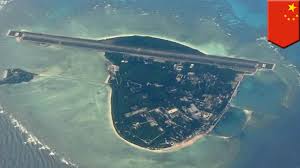By Nick Timiraos and Michael C. Bender
Wall Street Journal
Feb. 27, 2017 - President Donald Trump’s first budget proposal will seek a nearly 10% boost in military spending, with offsetting cuts from nondefense agencies, administration officials said Monday.
The budget will call for a $54 billion increase in defense funding with offsetting funding cuts for nondefense agencies, officials said. Those cuts could be spread across nondefense agencies and are likely to hit foreign-aid funding, officials said, reflecting Mr. Trump’s call for U.S. allies to pick up a greater share in global peacekeeping efforts.
“This budget will be a public-safety and national-security budget,” Mr. Trump said. “It will include a historic increase in defense spending to rebuild the depleted military of the United States of America at a time we most need it.”
He added, “This is a landmark event, a message to the world in these dangerous times, of American strength, security and resolve.” The White House will send federal agencies their proposed 2018 budget allocations at noon Monday, an official said.
The outline, due next month, will include only targets for discretionary spending programs, which represent around one-third of total federal spending. The blueprint won’t include proposed changes on tax policy or mandatory spending.
 China builds airstrip on small island it claims.
By Benjamin Haas
The Guardian
Feb 2, 2017 - Only months ago Donald Trump’s chief strategist predicted military involvement in east Asia and the Middle East in Breitbart radio shows.
The United States and China will fight a war within the next 10 years over islands in the South China Sea, and “there’s no doubt about that”. At the same time, the US will be in another “major” war in the Middle East.
Those are the views – nine months ago at least – of one of the most powerful men in Donald Trump’s administration, Steve Bannon, the former head of far-right news website Breitbart who is now chief strategist at the White House.
China builds airstrip on small island it claims.
By Benjamin Haas
The Guardian
Feb 2, 2017 - Only months ago Donald Trump’s chief strategist predicted military involvement in east Asia and the Middle East in Breitbart radio shows.
The United States and China will fight a war within the next 10 years over islands in the South China Sea, and “there’s no doubt about that”. At the same time, the US will be in another “major” war in the Middle East.
Those are the views – nine months ago at least – of one of the most powerful men in Donald Trump’s administration, Steve Bannon, the former head of far-right news website Breitbart who is now chief strategist at the White House.
In the first weeks of Trump’s presidency, Bannon has emerged as a central figure. He was appointed to the “principals committee” of the National Security Council in a highly unusual move and was influential in the recent travel ban on citizens from seven Muslim-majority countries, overruling Department of Homeland Security officials who felt the order did not apply to green card holders.
While many in Trump’s team are outspoken critics of China, in radio shows Bannon hosted for Breitbart he makes plain the two largest threats to America: China and Islam.
“We’re going to war in the South China Sea in five to 10 years,” he said in March 2016.
“There’s no doubt about that. They’re taking their sandbars and making basically stationary aircraft carriers and putting missiles on those. They come here to the United States in front of our face – and you understand how important face is – and say it’s an ancient territorial sea.”

